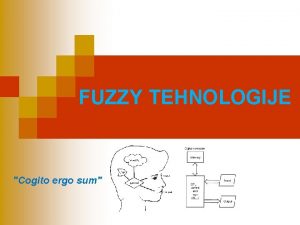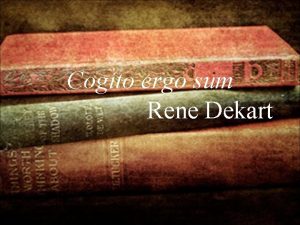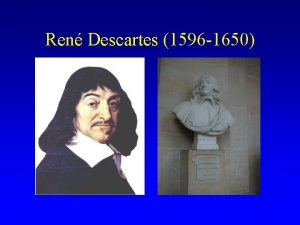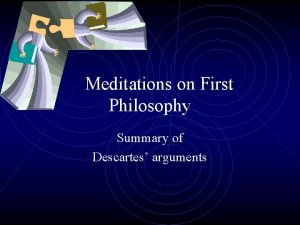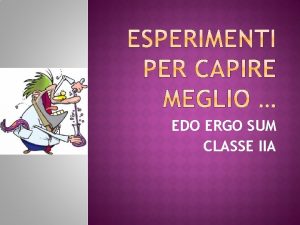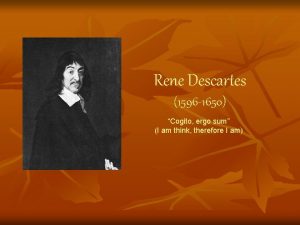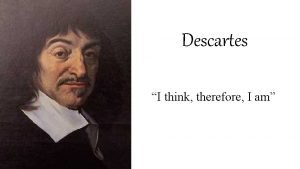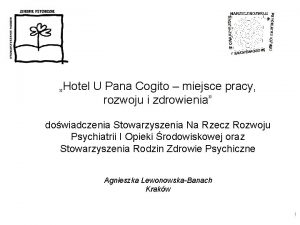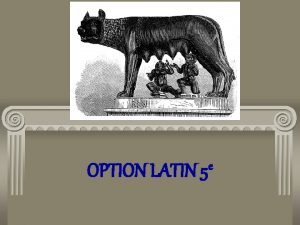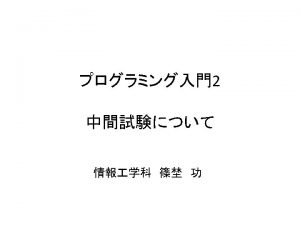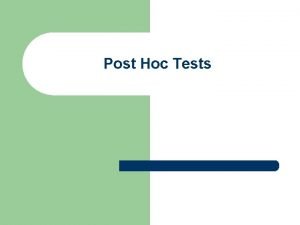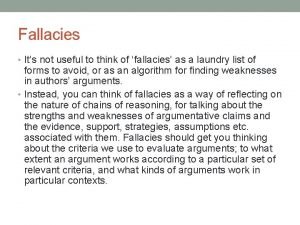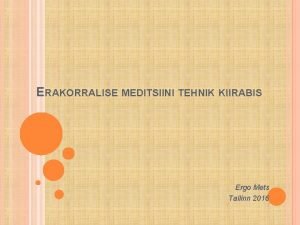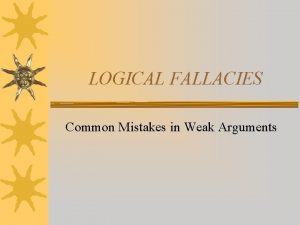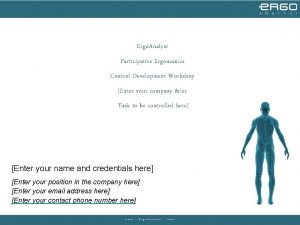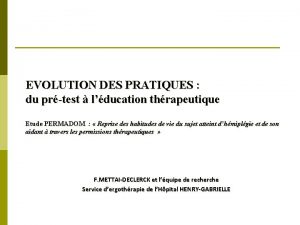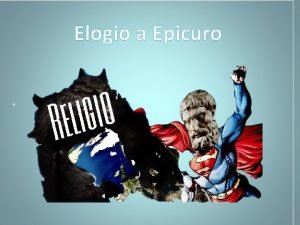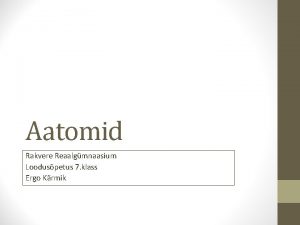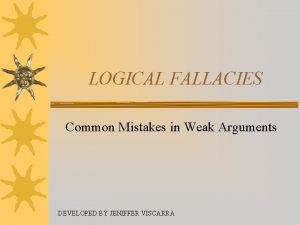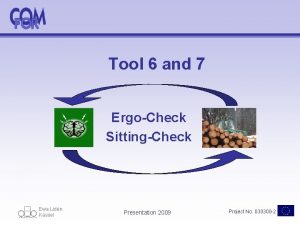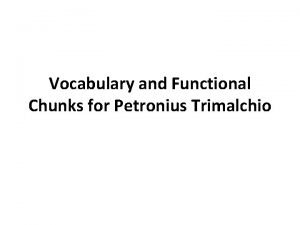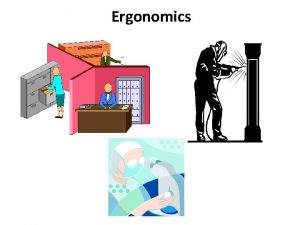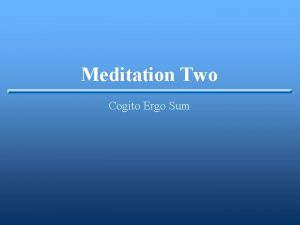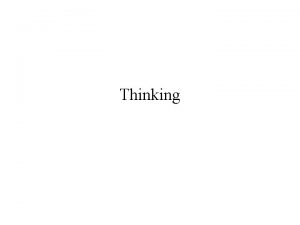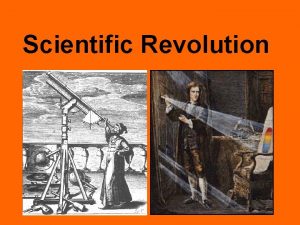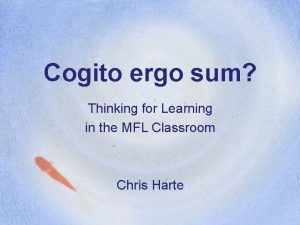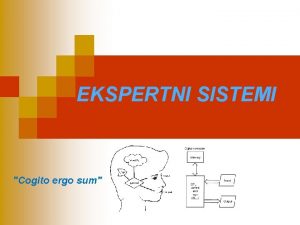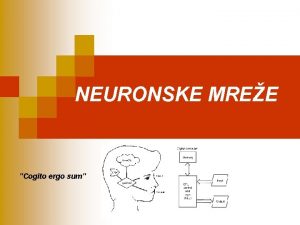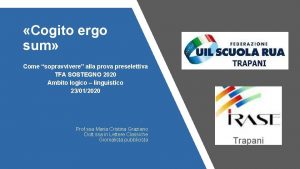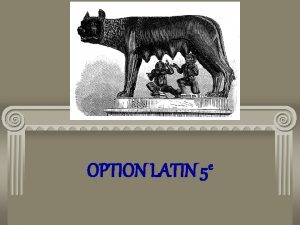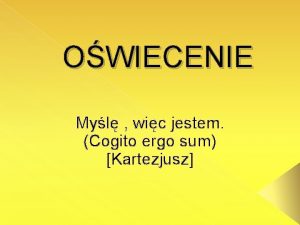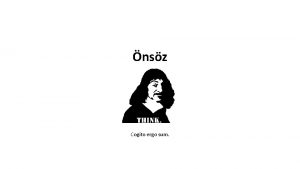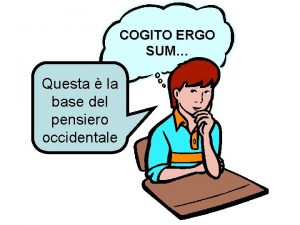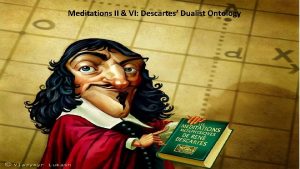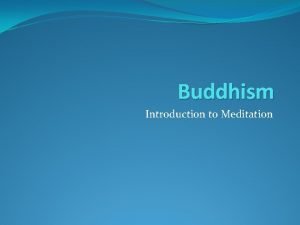Descartes Meditation 2 Cogito Ergo Sum I think





































- Slides: 37

Descartes Meditation 2 Cogito Ergo Sum- I think therefore I am

Mediation 2 we are going to look at: • Descartes’ Diabolic doubt • The Cogito- I am: I exist as a unique example of a self-authenticating, necessary truth. • The priority reason has over empiricisms • How the cogito has defined something unique about the nature of what is to be human

Diabolic Doubt Yesterday’s meditation filled my mind with so much doubts that I can no longer forget about them- nor yet do I see how they are to be resolved. But, as if I had suddenly fallen into a deep whirlpool, I am so disturbed that I can neither touch my foot to the bottom, nor swim up to the top. Nevertheless I will work my way up and I will follow the same path I took yesterday, putting aside everything which admits of the least doubt, as if I had discovered it to be absolutely false. I will go forward until I know something certain- or if nothing else, until I at least know for certain that nothing is certain

Reason as the foundation of Knowledge • Descartes began his second Med with a statement of what has been called the diabolic doubt- nothing was now certain. • It appeared that there was no foundation that could give Descartes the certainty that he desired • Had the sceptics won? • Can anything survive the evil genius? This is crucial point in the meditations. The hypothetical possibility of the evil genius argument and Descartes’ determination to put aside everything which admits of the least doubt had left him to doubt himself and the existence of physical world.

Reason as the foundation… • • 1) 2) 3) 4) By the end of Med 1 Descartes had managed to undermine two traditional views on knowledge. Aristotle's sense-based tradition and Plato’s reasonbased tradition He also at the same time carefully questioned all the traditional avenues for certainty that had dominated Medieval scholastic philosophy: Authority Sense experience Reason God.

Reason as a Foundation… • In fact in his short first meditation Descartes had essentially undermined the whole of western philosophy. • It looks as if Descartes has gone past a point of no return where there is no knowledge. • His method is so sceptical and strong that it could be that he is even being deceived about his own existence, maybe he too doesn’t exist! • But if he is being deceived the he must exit! • The all-powerful demon cannot deceive nothing into thinking that it exists when it doesn’t

In his own words! “But there is a deceiver (I know not who he is) powerful and sly in the highest degree, who is always purposely deceiving me. Then there is no doubt that I exist, if he deceives me. And deceive me as he will, he can never bring it about that I am nothing so long as I shall think that I am something. This it must be granted that, after weighing everything carefully and sufficiently one must come to the considered judgment that the statement ‘I am, I exist’ is necessarily true every time it is uttered by me or conceived” pg 25 Higher philosophy LTS

…. • So at the time of thinking that he is something, Descartes cannot in fact be nothing. • Thus “I am, I exist” has to be true. • At last Descartes has discovered the first principles that he has been searching for (this is often called the Cogito) • Descartes foundation of knowledge is the simple observation that he was conscious of the fact he existed. It’s not just that Descartes proved theoretically that he existed. Descartes KNEW that he existed.

… • Descartes made a similar point in an earlier text called the Discourse on Method (1637) in which he used a phrase that has become the most memorable and famous phrase in philosophy: • ‘Cogito Ergo Sum’- ‘I think, therefore I am’

“I am : I exist” • This phrase is often referred to as a necessary truth. • It led Descartes on to reflect in some depth about the nature of the “I”. • Descartes still insists that we could be deceived by the evil demon so he could not ‘know’ anything about his physical body- all he could know was that he was thinking

In his own words! • I now admit nothing that is not necessarily true. I am therefore precisely only a thing that thinks; that is, a mind, or soul, or intellect, or reason-words the meaning of which I was ignorant before. Now, I am a true thing and truly existing; but what kind of thing? I have said it already; a thing that thinks- pg 25 Higher Philosophy LTS.

The Cogito activity Possibly the most important theme in the Meditations concerns Descartes’ understanding of the nature of the human mind. Let us take some time to discuss what it is to be human… • What is a human? • What makes you different from other animals? • Is your mind separate from the rest of your body? • Are you just a physical thing or do you have a non-physical dimension? Your answers should be no more than 100 words.

All coming back to the mind… • Descartes reflections on the nature of ‘man’ all end up coming back to the mind. • For him, the central mark of a human is that he/she is a conscious, thinking thing. • These reflections are Descartes’ desire to replace Aristotle's sense-based philosophy with all his rationalistic agenda. • “I am: I exist” has survived the evil genius. • Descartes conscious mind alone allowed him to overcome even the most sceptical arguments.

All coming back to the mind… • For Descartes, then, rationalism and not empiricism should be the foundation for knowledge. • The sense were easily defeated, reason, although appearing initially to succumb also the evil genius but survived in the end. • The cogito is Descartes’ first principle of philosophy. • It appears beyond dispute because it is self-authenticating statement

Isn’t it Obvious? ? • It is clearly self-contradictory to say ‘I don’t exist’ • It is clearly ‘self-evident’ that ‘I am: I exist’ is a self-evident truth or that ‘thinking requires a thinker’ • Descartes had provided his readers with the ultimate infinite regress argument which asks the question: ‘How do you know you are not being deceived by an evil demon?

Cont’d • He then uses the most powerful question a sceptic could ever ask as the very trigger to his own foundation of knowledge. • Descartes ended the infinite regress by finding a truth that is beyond dispute. • Descartes’ belief that he existed is a belief that is absolutely certain and assured. • Descartes foundation was found through the process of ‘thinking alone’ • For Descartes, the cogito showed that reason must take priority over experience. • He tried (possibly successfully) to show that a priori truths are more certain than a posteriori truths • There was clearly something special about thinking

What’s wrong with the cogito? 1) Is there a questionable suppressed premise? • Most criticism of cogito in its earlier format; “I think therefore I am”, in the Discourse on Method. 1) The suppressed premise: First raised by Lichtenberg I think Thinking things exist Therefore I am

What’s wrong with the cogito? 1) Is there a questionable suppressed premise? The suppressed premise: I think Thinking things exist Therefore I exist This premise is questionable -Do the existence of thoughts necessarily imply a thinker? David Hume argued that we have no right to assume this, as does the anatta (no-self) doctrine of Buddhism. Perhaps Descartes should have said, “There is thinking going on therefore there are thoughts. ” The cogito therefore doesn’t actually establish the existence of a self. “I” is merely a linguistic convenience. It doesn’t actually refer to anything, no more so than the “It” in “It is raining. ” It can be argued that Descartes strays from his rationalistic agenda here since “thinking things exist” is an aposteriori, empirical observation.

What’s wrong with the cogito? 1) Is there a questionable suppressed premise? The suppressed premise: Counter arguments I think Thinking things exist Therefore I exist Ownerless, thinkerless thoughts – pretty weird! The suppressed premise argument assumes that Descartes intended the cogito as a piece of syllogistic (deductive) logic. However Descartes did not intend the cogito to operate this way. The meditations should be seen as a course in guided self-discovery and the cogito as a self-authenticating proposition. According to Cottingham, Descartes expressly made this point to Leibniz at the time. Descartes restates the cogito in the Meditations as “I exist is necessarily true. ” to clarify this and overcome the criticism

What’s wrong with the cogito? 2) The cogito is circular. I think Therefore I am According to Bertrand Russell the cogito is circular since it assumes what it is setting out to prove.

What’s wrong with the cogito? 2) The cogito is circular. Counter argument I think Therefore I am But as with the suppressed premise argument, Descartes never intended the cogito to be a deductive argument and his restatement of the cogito in the Meditations (I am, I exist is necessarily true) overcomes this criticism.

What’s wrong with the cogito? 2) The cogito is trivial - It doesn’t tell us anything of significance. Most critics of Descartes are willing to grant him the cogito but would argue that if this is as far as his argument goes then he has established very little indeed. His task is to overcome scepticism and produce some certainty about the world out there. He claims this is his Archimedian point, his foundational proposition upon which he will build knowledge but as we see he abandons this as a foundation and uses arguments for God as his means of overcoming scepticism.

What’s wrong with the cogito? 3) Could you exist without a body? Descartes is a dualist - he believes in the existence of a body and a mind. He argues that although he may be deceived into believing he has a body, by an evil demon, he must have a mind since he has thoughts. This view-point is contrary to modern neuroscience (study of the brain) which takes a monist position – we only have a body. Thoughts exist in the brain nerve cells. Without a brain there can be no thoughts. If you can’t exist without a body then Descarte’s position is seriously undermined.

Cartesian Dualism… • The cogito also opened the way for Descartes to present his mind/body dualism… • Descartes believed that his mind was a separate kind of thing from his body. For one thing, he thought his body, like all physical things, had 'extension' (for which read 'volume')

Cont’d • whereas his mind did not. He believed that states in his body (including his brain) *caused* changes in this separate mind corresponding to different experiences/mental states • The non-physical mind would then *cause* a change in bodily (brain) state (to cause a physical response of whatever kind).

Knowledge of the Wax Descartes argues that he has more certainty of the existence of the mind than that of the body because whereas he may be deceived into believing that a physical world (including his body) exists, he, as a mind, must exist to be deceived in the first place. • He says that although he can’t establish that he has a body, he can establish that he is a “thinking thing”. It is important to note that the following argument is an analysis of matter as it appears to Descartes mind.

The wax argument… To further demonstrate the limitations of the senses, Descartes proceeds with what is known as the Wax Argument. He considers a piece of wax: his senses inform him that it has certain characteristics, such as shape, texture, size, colour, smell, and so forth. When he brings the wax towards a flame, these characteristics change completely. However, it seems that it is still the same thing: it is still a piece of wax, even though the data of the senses inform him that all of its characteristics are different.

The wax argument…. Therefore, in order to properly grasp the nature of the wax, he cannot use the senses: he must use his mind. The wax example is used to show the superiority of rationalism over empiricism. Since the wax changes all the time it is reason rather than the senses which allow us to know the wax.

The Key points of Meditation 2 • The cogito has been used to defeat the most extreme sceptical arguments. • The statement of Diabolic doubt at the beginning of Meditation 2 has been overcome. • The cogito has been provided the key foundations for Descartes’ future knowledge claims.

Cont’d… • ‘ I am: I exist’ is a unique example of a self-authenticating, necessary truth. • ‘I am: I exist’ is the starting point of Descartes’ argument that reason should take priority over empiricism. • The cogito has defined something unique about the nature of what it is to be human.

So… • But what is he? Since he is conscious he must be thinking thing or conscious being, and all ‘modes’ of his consciousness must be part of what he is. • Looking into his mind Descartes’ lists all the different ‘modes’ of his consciousness that he discovers • Firstly he has an intellect, something in him that enables him to reason.

… • He has a will that helps him make choices and decide what to think or believe. • He has an imagination which is his ability to picture physical things. • Finally he has sensations, so he has an awareness of experiences which appear to come from his body and through his sense organs.

Nearly there!! • Descartes observes that sensations, consideration purely as a mode of his consciousness, is something he is directly aware of and can know he experiences, even while he is yet unsure that any physical things exist beyond his mind, including his own body. • He uses the wax argument to show that his senses perceive only the outer appearance, while the mind judges that the substances or essence of the wax persists beneath this appearance.

Finally!!! • Descartes’ concludes the Meditation by saying that he now knows himself better, for while the existence of the wax remains in doubt, his own existence is certain, since he must exist to have any perception of the wax. And Relax!!!!!!

Homework… The Meditations are a description of the journey that Descartes makes in his mind in order to establish a “firm and permanent structure in the sciences” or knowledge that cannot be doubted. Your task is to represent the first part of this journey, leading to his ‘firm spot’, as a map showing the key events and challenges that Descartes faces.

Content • You will need to show the following key “places” on the map: • Descartes’ project • Descartes’ method • Knowledge from the senses • The Dreaming Argument • The Evil Genius/Demon • The Cogito Higher make sure you have room for Meditation 3 and 6!!

Key Criteria • The map should show a creative use of symbols and landmarks as representations of Descartes’ journey and pitfalls of his argument. • The map should also include key quotations.
 Cogito ergo sum znacenje
Cogito ergo sum znacenje Cogito ergo sum dekart
Cogito ergo sum dekart Cogito ergo sum essay
Cogito ergo sum essay Christian meditation vs eastern meditation
Christian meditation vs eastern meditation Descartes meditations summary
Descartes meditations summary Dream with eyes open
Dream with eyes open Plato and descartes
Plato and descartes Edo ergo sum
Edo ergo sum Iia
Iia Edo ergo sum
Edo ergo sum Incognito ergo sum
Incognito ergo sum I think there for i am
I think there for i am Pensjonat u pana cogito
Pensjonat u pana cogito Cogito latin
Cogito latin Int sum(int a int n) int sum=0 i
Int sum(int a int n) int sum=0 i Think family ni
Think family ni Think said the robin
Think said the robin Studentized range statistic
Studentized range statistic Ergo nomos
Ergo nomos Post hoc ergo procter hoc
Post hoc ergo procter hoc Arti ergos pada ergonomi
Arti ergos pada ergonomi Erakorralise meditsiini tehnik
Erakorralise meditsiini tehnik Hasty generalization fallacy
Hasty generalization fallacy Ergo analyst
Ergo analyst Mekanik gerilme ergonomi
Mekanik gerilme ergonomi Nepiro ergo
Nepiro ergo Mhavie
Mhavie Opteritur
Opteritur Ergo kärmik
Ergo kärmik Post hoc fallacy
Post hoc fallacy Comergo
Comergo Ergos nomos
Ergos nomos Kvello modellen
Kvello modellen Gmat
Gmat Lidn
Lidn Post hoc ergo procter hoc
Post hoc ergo procter hoc Venerat iam tertius dies
Venerat iam tertius dies Ergo nomic
Ergo nomic
